Flying London – Uzbekistan with Wizz Air: a review
If, like me, you’ve looked on Skyscanner and seen cheap Wizz Air flights to Uzbekistan from London (or anywhere else in Europe for that matter), you might be wondering what that’s like, if it’s worth it and – if you haven’t a scooby where Uzbekistan is – whether or not this country is worth visiting. In this blog post I’ll be going through everything to do with those flights with a fine-toothed comb.
An intro to Uzbekistan
Uzbekistan is a country that’s been making waves in travel circles as of late. Its old cities, dotted with grand blue mosques, bustling bazaars and welcoming guesthouses, have been wowing visitors since the time of Marco Polo. Names like Samarkand and Bukahara became eponymous with Timbuktu and Constantinople, exotic cities through which some very fine goods were making their way into the houses of the European nobility.
More recently, Uzbekistan has been doing plenty to woo modern tourists – abolishing their stringent visa regime and building miles of high speed railway lines were a pair of PR coups de grace that practically made the country a tourism magnet overnight. Travelling around the country is quite cheap, so the country has a small backpacker scene – nothing like Thailand yet, but with beer freely available it’s certainly not off the cards. And now, regular flights with the famously low-cost Wizz Air have opened the country up further for budget travellers.
Where is Uzbekistan and what is there to do there?
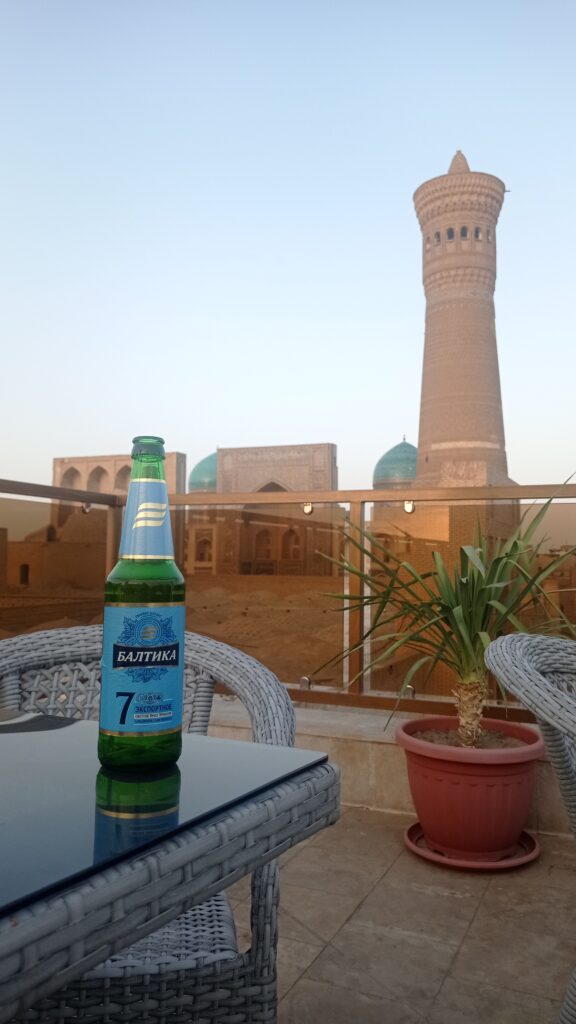

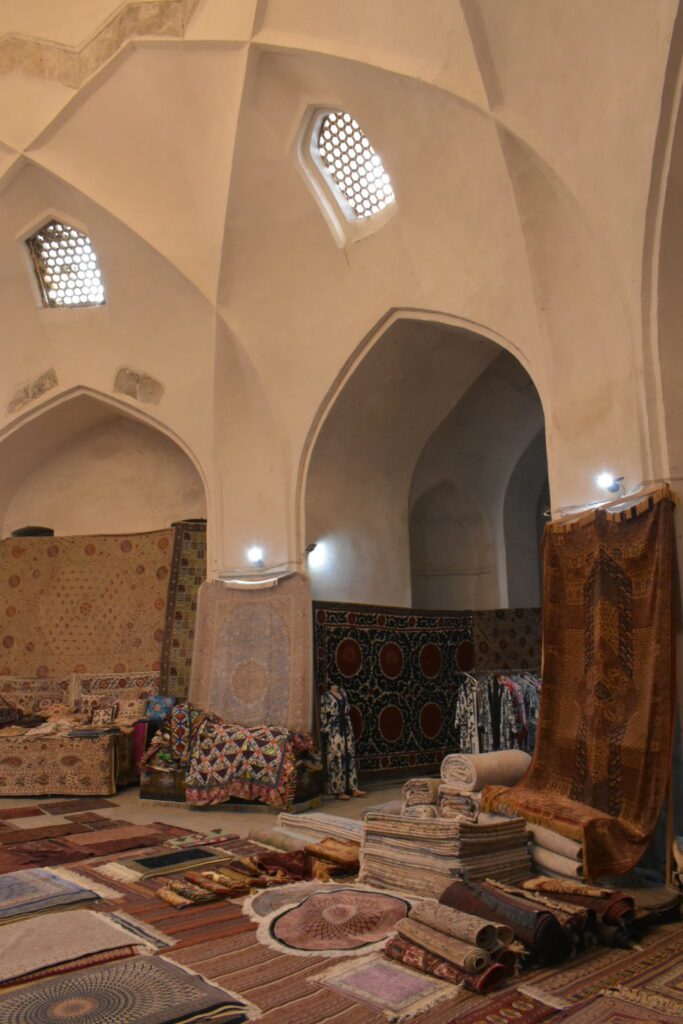

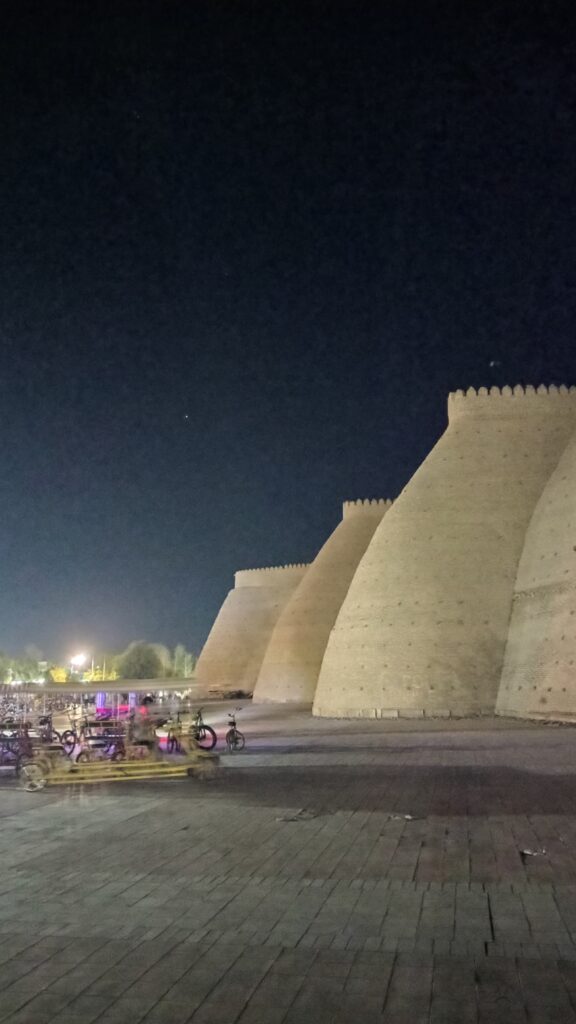

When I told people I was going to Uzbekistan, the first question many asked me was “where is that?” Here’s a map for a quick answer.
For a visitor’s lay of the land, there are four places most people visit: Tashkent, the Soviet-influenced capital, and Bukhara, Samarkand and Khiva, three ancient cities.
Its history is a fascinating one, one that goes back to the time of the Silk Road, a trail along which travelled the namesake silk, spices, tea and other goods from China to the Middle East, and eventually Medieval Europe. The area’s cities changed hands between various empires – Alexander the Great, the Mongols, the Persians, the Russians. At one point under Timur Lane, a national hero in Uzbekistan, they had a crack at the empire game themselves, expanding all the way to Russia and Turkey. Whether through conquest, trade or a mixture of the two, the cities of what would become Uzbekistan grew immensely wealthy and their history left behind a rich heritage.


Uzbekistan is a very cheap country to travel around, on a par with southeast Asia (if not cheaper). This is the kind of country where spending a fiver on lunch is extravagant, where a good guesthouse with a filling breakfast goes for a tenner and where a bottle of beer rarely costs more than £2 (most of Uzbekistan is Muslim, but many drink alcohol regardless).
Visiting Uzbekistan is nowhere near as difficult as it used to be: as well as visas being abolished and new high-speed trains connecting the major cities, many young people now speak English. While I’d read stories of ATMs having no cash and SIM cards being a headache to get, I was done with both pretty much as soon as I’d landed.
Is it worth flying with Wizz Air to Uzbekistan?
How much would it otherwise cost?
For a short and oversimplified answer, I paid a grand total of £230 return for my flights from London Luton to Samarkand, and the second-cheapest was a direct flight from Heathrow to Tashkent for £600 with Uzbek Airways.
Things are a bit more complex than ticket prices, however.
Extra costs
As anyone who’s flown with Ryanair or Wizz Air in Europe will tell you, it’s getting increasingly difficult to only pay the cheap fare Skyscanner presents you with. Want more than an underseat bag? That’ll cost extra. A cup of coffee from the trolley? Extra. Using the toilet? Not extra yet, but it’s an idea they’ve toyed about with in the past.
It’s no different with this set of Wizz Air flights: taking an overhead bag for every leg would have cost me another £300. It was at this moment that I really started asking myself if this was worth it – alas, my ability to travel light reached new heights on this trip.
The route you’ll take
When flying to Uzbekistan, or anywhere else in Asia with Wizz Air for that matter, you’ll go through their regional hub of Abu Dhabi. However, since there aren’t any direct flights to Abu Dhabi with Wizz Air from London, you’ll also have to transit somewhere – where exactly that will be depends on the day you travel. For me, it was a stopover in Tirana on the way there and Belgrade on the way back, with the trip beginning and ending in London Luton. When I was looking up flights I also saw stopovers in Budapest, Santorini and Tel Aviv.
Some of these stopovers will be quite long, allowing you to see a bit of a new country, while others will only be a couple of hours. Be very cautious of any that are shorter than this, since otherwise you could run the risk of missing your connection (see the next section).
At each stopover you must pass through border control then go back through again – no transit area for you, I’m afraid. If you’re a Brit you shouldn’t need a visa for any of the countries you pass through, but be mindful of this. Also, mind that some countries will stamp your passport, so make sure you’ve got enough pages.
Another slight frustration is that many airports in Eastern Europe and the Middle East don’t accept mobile boarding passes, so you’ll either have to print them off or present yourself at the check-in desk for a document check. However, you should still do the check-in process online – not only will this prevent Wizz Air from trying to whack you with an airport check-in fee, but the document it gives you at the end will tell you what exactly you need to do at the airport.
What happens if you miss a connection
It’s actually a bit misleading to call this missing a connection, since you’re actually flying multiple flights rather than a connecting flight.
Technical jargon aside, a bit of a step back: when you’re booking your flights, be extremely careful to check that the agency you book with provides transfer protection. Basically, they’ll cover the costs of a replacement flight and hotels if a delay causes you to miss the next leg. Check that it isn’t offered as an optional extra, and read the fine print for how to make a claim should the need arise. It should go without saying that you’ll be up the creek if it was your own fault you missed the flight.
Bottom line is, buyer beware.
If worst came to worst and you missed a connection, your first port of call would be to talk to a Wizz Air staff member and ask them nicely if they can put you on another flight. Don’t be surprised if that’s a no-go.
Failing that, you’ll need to do whatever procedures the people you booked your ticket through have laid down. You should just be able to book a new flight and then claim back this later, but make sure to check this.
Your travel insurance may also be able to help you, though they’ll expect you to first get in touch with the agency/ flight company. Be very careful to check your policy documents: some only cover outbound travel.
Obviously, missing a connection has a knock-on effect, so I’d always recommend giving yourself a day or two in either Abu Dhabi or wherever you pass through on the way.
What Abu Dhabi and the rest of the UAE is like
If you’re going to Uzbekistan, I’m going to assume you’re a bit of a history buff. Abu Dhabi and the UAE as a whole don’t exactly compare, given that most of their development happened in the 1970s, but there are bits and pieces here and there: Qusr al Hosn, a low-level fort in Abu Dhabi surrounded by skyscrapers, once stood tall amid the desert as the home of the Sheikh. A museum inside chronicles how the UAE’s inhabitants lived before the oil boom – pearl fishing and date farming were their main “industries”, as well as trade with the British en route to India. Beside it is the parliament building from which the UAE declared their independence.
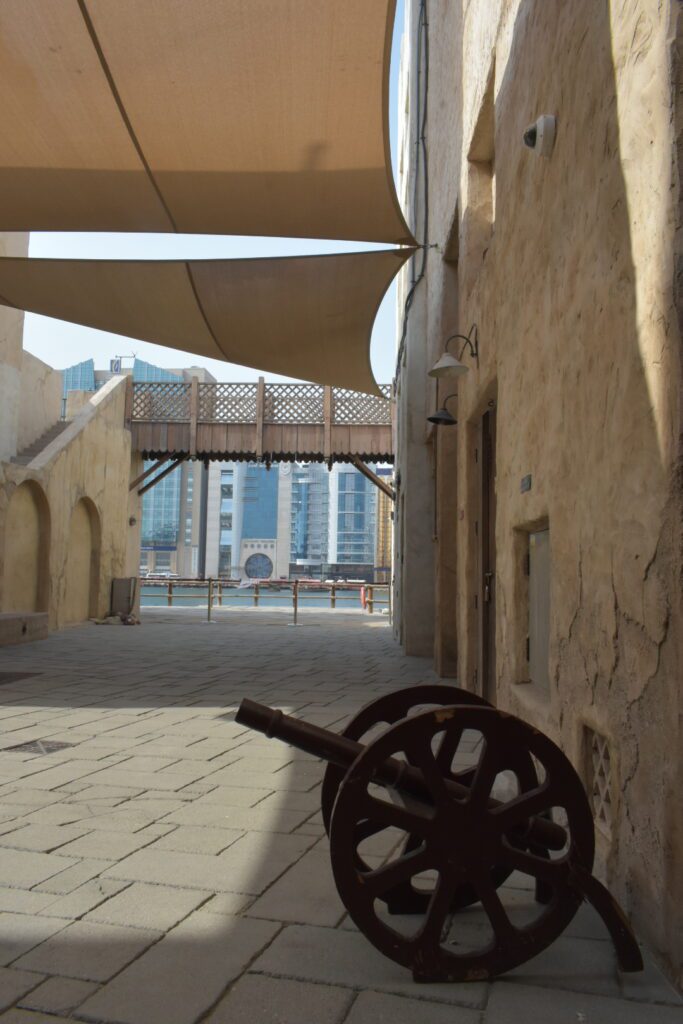

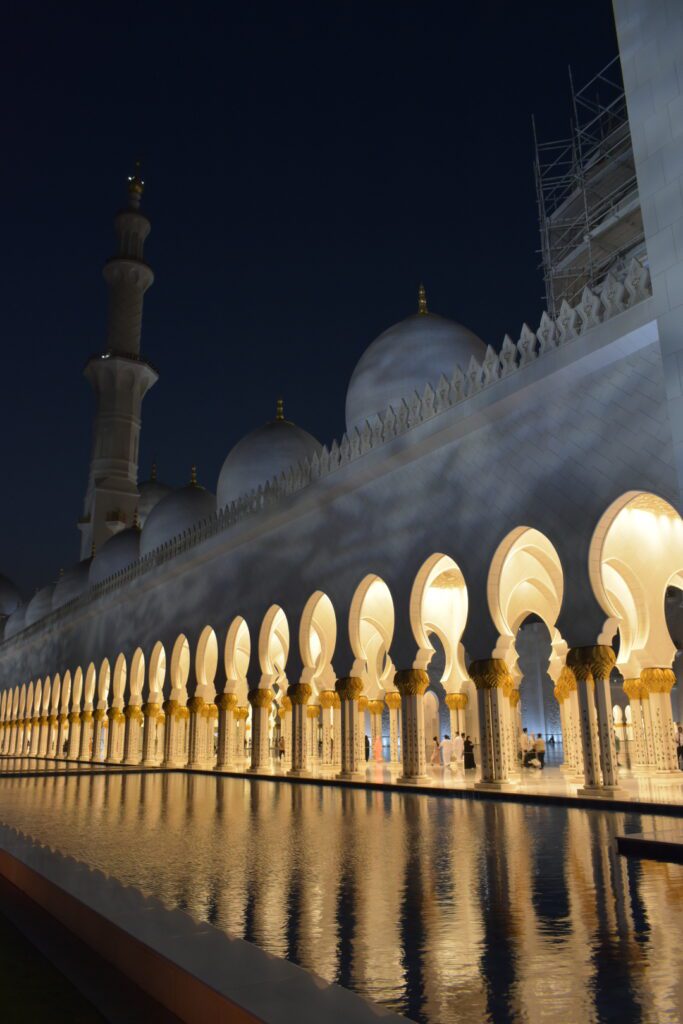

Dubai has a similar small museum in the Al Fahidi fort and an old-style souk which, though a complete replica, is not a bad effort by any stretch and has some interesting small museums and art galleries. I personally visited the Coffee Museum, a two-storey affair full of old coffee grinding machines and a timeline poster detailing how coffee became what we know and love today.
While the UAE’s cities are pedestrian–friendly and have green spaces here and there, you won’t want to walk far in the 40-degree heat. Thankfully, buses and tube lines are extensive.
Abu Dhabi is a little less flashy than Dubai, with its main sights being the impressive Grand Mosque and the recently opened Louvre. Other than that there’s little to see, though I can comfortably call the city’s curry scene a highlight. With a large Indian and Pakistani population, there are plenty of cheap eateries where you can get authentic curry and naan, complete with cricket on the TV and eating with your fingers.
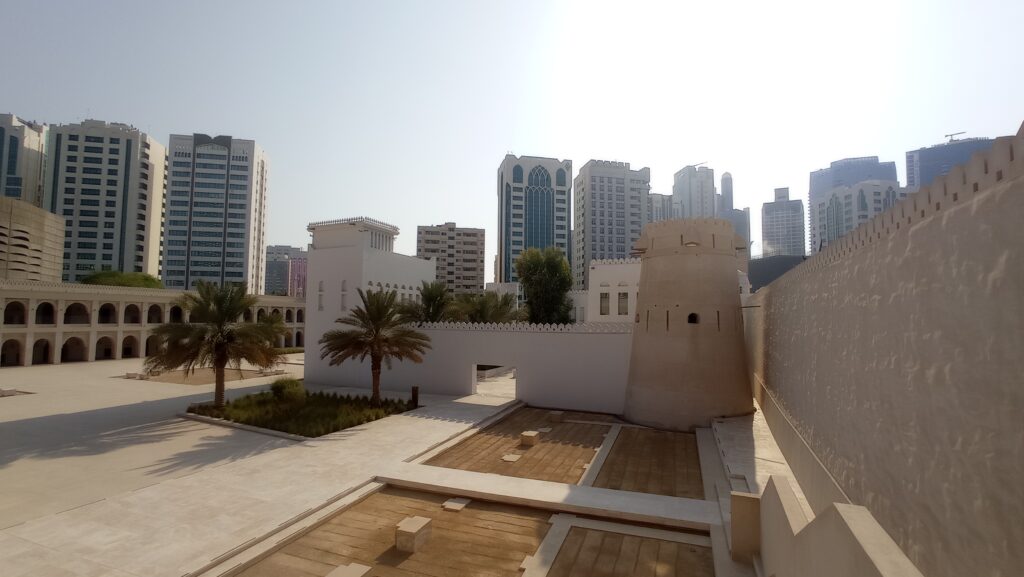

Dubai by contrast is where you’ll find many of the megaprojects the UAE is so famous for: here be the Burj Khalifa, once the world’s tallest building, the artificial island Palm Jumeirah and the seven-star Burj al Arab hotel.
How much does it cost to stay in the UAE
While you might think the UAE would be expensive, you’d be surprised: generally speaking things are cheaper than in the UK, thanks in part due to the influx of immigrant workers. Seeking out Indian eateries and hotel deals on Booking.com, I was able to snag plenty of bargains. The only thing I found was the same price as the UK was pints, though this was in an Irish pub in a fancy hotel.
Hotel room – £45
Pakistani lamb curry, naan bread and drink – £7
Bus journey – 40p
Pint of beer – £6




